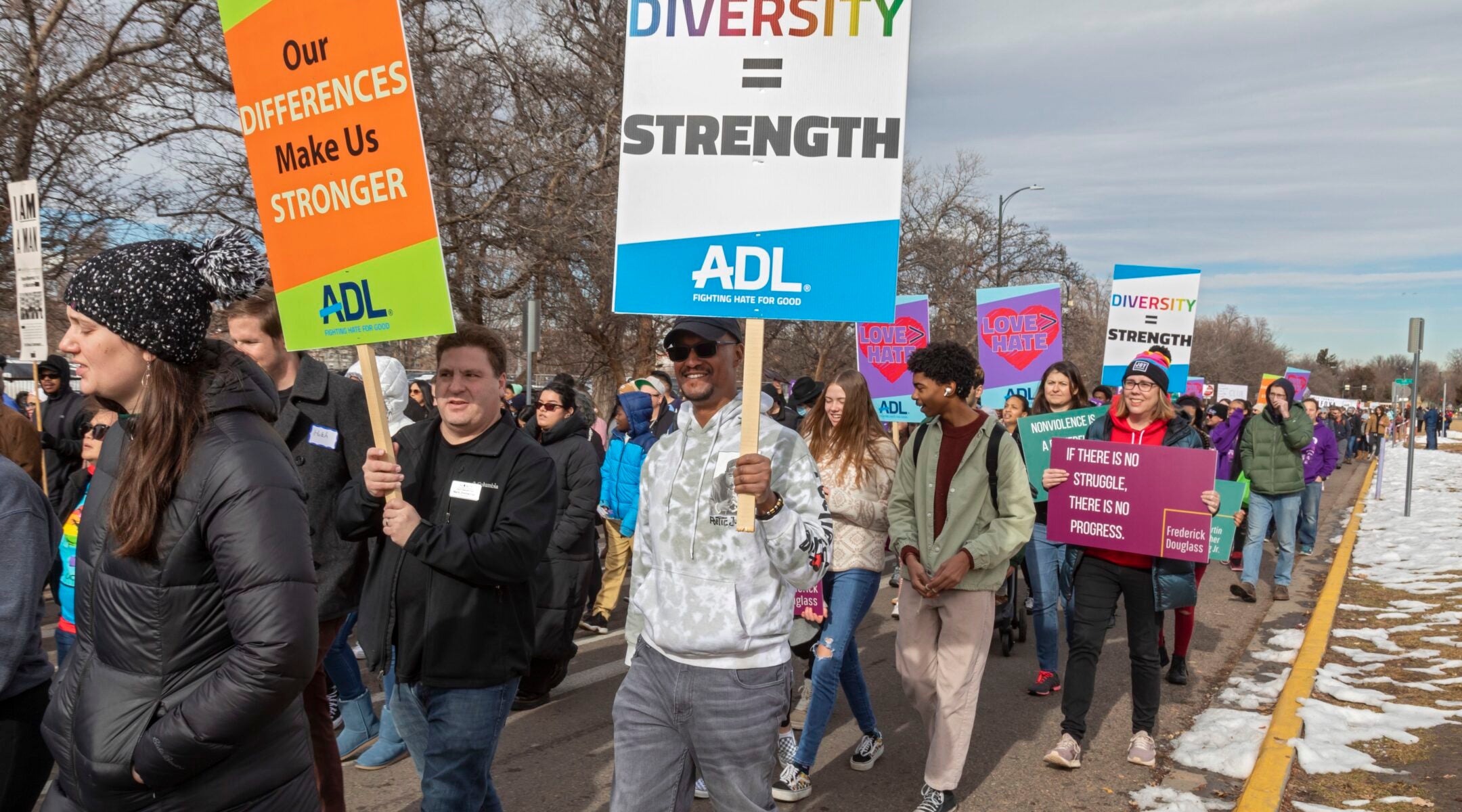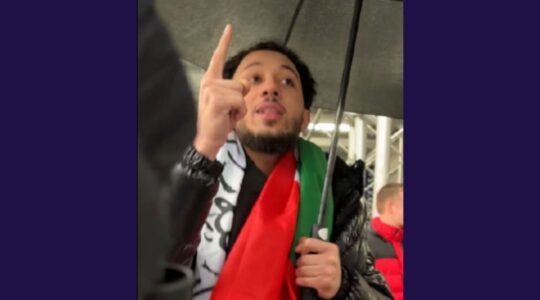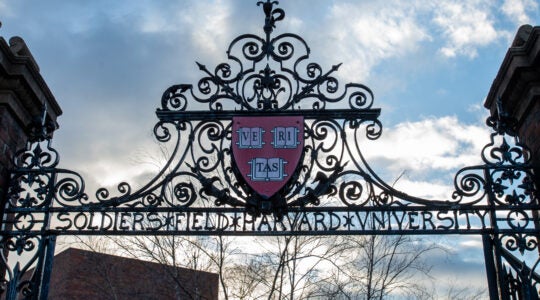The Anti-Defamation League has removed entirely from the “What We Do” page of its website a section called “Protect Civil Rights.”
The removal eliminated a passage that read, “Our founders established ADL with the clear understanding that the fight against any one form of prejudice or hate cannot succeed without countering hate of all forms.”
The change to the website, which has not been previously reported, was made amid other website edits following a flurry of right-wing criticism and an unprecedented attack on the organization earlier this month by FBI Director Kash Patel.
On Oct. 1, just hours before Jews on the East Coast would start fasting on Yom Kippur, the holiest day of the Jewish year, President Donald Trump’s handpicked top cop said the law enforcement agency was cutting ties with the ADL. The Jewish group was “functioning like a terrorist organization” because of how it tracks and reports extremism on the right, Patel told Fox News.
Patel’s announcement came days after Elon Musk mischaracterized a section of the ADL website to accuse the group of anti-Christian hatred. His post on X triggered a pile-on of condemnation. The ADL removed the section from its website as part of a purge of more than 1,000 other entries making up its Glossary of Extremism and Hate.
An ADL spokesperson told the Jewish Telegraphic Agency that the passage committing the ADL to the protection of civil rights was removed as part of an “ongoing review” of its website and its contents.
“This month, ADL has conducted deferred maintenance on the website, which had grown in recent years to more than 25,000 pieces of content — some even dating back to more than 30 years ago and clearly no longer relevant or reflective of ADL’s work today,” the spokesperson said.
A recent article by ADL CEO Jonathan Greenblatt makes clear how the ADL’s focus has changed: He outlined a withdrawal from the group’s commitment to the protection of all vulnerable minorities in favor of a mission centered more exclusively on anti-Jewish hatred.
The ADL is not commenting on its relationship with the FBI or Patel’s attack beyond the statement praising the agency it issued in the immediate aftermath.
“ADL has deep respect for the Federal Bureau of Investigation and law enforcement officers at all levels across the country who work tirelessly every single day to protect all Americans regardless of their ancestry, religion, ethnicity, faith, political affiliation or any other point of difference,” the statement said.
It’s still not yet clear what impact Patel’s announcement will have — in part because the ADL didn’t receive an official notice that might have offered details.
“ADL has not yet received any formal communication from the Administration, and we are working to learn more,” Greenblatt said in a note to Jewish groups that arrived in inboxes just hours after Fox News published its exclusive interview with Patel and minutes before Yom Kippur started.
A longstanding partnership that provided FBI agents training on topics such as hate crimes, violent extremism and antisemitism through a workshop at the U.S. Holocaust Memorial Museum is thought to be terminated.
Meanwhile, however, the ADL’s extremism trackers continue to exchange tips with the FBI, JTA has learned.
The ADL’s initial reaction may have been shaped by the shock of Patel’s decision, but the group’s ongoing silence on the issue appears to be part of a strategy.
The group never sought to rally a communal outcry from Jewish organizations. In fact, it did the opposite, pleading behind the scenes for them to shut up, an extraordinary move for an organization — and a community — that has in the post World War II era prided itself in speaking out against injustice.
“We’re really following ADL’s lead here,” said a senior official of a major Jewish group that has refrained from commenting on the FBI letter, and who asked for anonymity to speak candidly. “They’re determining how to navigate it in the way that makes sense for them.”
The muted reaction by Jewish legacy organizations can be read, their critics say, as acquiescence to an administration accused of leveraging government power to silence and destroy civil society critics.
Another factor is a community profoundly roiled by the hostility to Israel and Jewish attachment to the country that has emerged among the left and Democrats, the community of American thought where most Jews have thrived for more than a century.
But not everyone is willing to go along with the approach.
Amy Spitalnick, the CEO of the Jewish Council for Public Affairs, said Patel’s attack was evidence that it was futile to hope that the trumpeting of common ground with the Trump administration, as the ADL and others have done on Israel policy, would lead to comity.
“This is a reminder that they’re coming for everyone that doesn’t 100% align with their agenda and their approach,” Spitalnick said. “This is about a far more systemic abuse and weaponization of the federal government to advance a political agenda. And that should frighten all of us.”
Appeals by Spitalnick and others for a united Jewish front against the Trump administration’s assault on civil liberties have not just fallen on deaf ears among legacy Jewish groups, they have encountered active resistance. The Jewish Federations of North America, the goliath umbrella body for 150 or so local federations, in April urged constituent groups not to sign onto a JCPA-led statement decrying the Trump crackdown on speech under the pretext of stemming antisemitism.
Six months later, Jewish officials are wondering whether traditional Jewish advocacy on issues such as civil rights will survive the onslaught.
Officials are closely reading a Sept. 25 National Security Presidential Memorandum, purportedly spurred by the killing of Charlie Kirk, that sets up a task force that includes nonprofits among the entities it will investigate for “support” of “political violence, terrorism, or conspiracy against rights; or the violent deprivation of any citizen’s rights.” It also identifies “common threads” of such movements as including “anti-Christianity” bias or “hostility toward those who hold traditional American views on family, religion, and morality.”
These catchall phrases are so broad that they may place numerous NGOs in the government’s crosshairs, said Halie Soifer, the CEO of the Jewish Democratic Council of America.
“When the White House erroneously accuses the ADL of ‘anti-Christian’ bias and ‘functioning like a terrorist organization,’ it creates fear of who is next, and honestly, that fear is justified,” Soifer said. “It’s clear the Trump administration is aiming to expand the definition of terrorism, to weaponize it against Americans with whom they disagree.”
Close to 4,000 nonprofits, including dozens of liberal Jewish groups, signed an open letter last month expressing alarm at the presidential directive.
“This attack on nonprofits is not happening in a vacuum, but as a part of a wholesale offensive against organizations and individuals that advocate for ideas or serve communities that the president finds objectionable, and that seek to enforce the rule of law against the federal government,” said the letter.
Jonathan Jacoby, the president of the Nexus project, which seeks to combat antisemitism while mitigating its weaponization, said Trump had the Jewish community in his sights.
“The Trump administration’s actions are not just challenging liberals or progressives or Democrats, they’re challenging Jews to respond. They’re challenging every Jewish organization,” he said. “It’s a clear example of why every Jewish organization, or every organization that represents Jewish interests, should be calling this out loud and clear.”
One of the ironies of Patel’s attack is that it has brought out groups that have clashed with the ADL over whether the group has blurred the differences between antisemitism and legitimate criticism of Israel to the group’s defense, while the ADL and its allies remain silent.
“While we have had our differences with the ADL over the years, the organization has played a central role in combating antisemitism and extremism in the United States for more than a century,” J Street, the liberal Jewish Middle East policy group said in a statement. “Ending the FBI’s long-term partnership with the ADL, while smearing the organization in this manner, will only embolden extremists and make American Jews less safe.”
The organizations that have lobbied hardest for further protections of synagogues and other institutions have been silent on the FBI-ADL breach; the JFNA, the Orthodox Union and the Secure Community Network declined or did not respond to requests for comment.
Leaders of the Reform and Conservative movements released statements for this story emphasizing the necessity of the ADL’s work with law enforcement — but without criticizing or even mentioning Patel’s attack.
“For decades, the ADL has worked with our movement’s network of congregations and also with law enforcement at every level, whose commitment we deeply respect,” said Rabbi Jacob Blumenthal, the CEO of the United Synagogue of Conservative Judaism. “These partnerships protect our communities and must continue, and we are expressing our support for the ADL’s collaboration with law enforcement through the most appropriate and effective channels.”
Rabbi Rick Jacobs, the president of the Union for Reform Judaism said his movement was “aligned with the ADL’s commitment to fighting antisemitism and advancing Jewish communal safety … We hope the FBI will continue to join in that effort as it has over many decades to the benefit of the nation overall.”
The ADL has endeavored since Jan. 20 to accommodate Trump 2.0, praising some of its actions targeting universities where pro-Palestinian activism has at times created a hostile environment for Jewish students. Greenblatt, in comments first reported by the Forward, in June praised the Trump administration’s crackdown on universities in an address to a conference of Republican state attorneys general.
“I don’t agree with everything the Trump administration is doing, I don’t want to shut down these schools altogether,” he said. “But you know what? God bless [Education] Secretary [Linda] McMahon.”
Such statements have spurred claims that Greenblatt is steering the organization right, perhaps at the behest of donors the ADL shares with Trump or to avoid clashing with an administration that has sought to punish its critics. A New York Magazine deep dive in August into Greenblatt’s apparent shifts laid out what it said was evidence of a rightward drift.
Greenblatt in a subsequent interview with The New York Times said the group remained steadfastly nonpartisan. “We’ve worked with presidential administrations over generations, right and left,” Greenblatt said. “We don’t agree with them on everything, but where we can find common ground, we try. And where we have a point of disagreement, we make that known.”
Attempting to assign to Greenblatt a place on the left-to-right continuum may not make sense. His trajectory is more outside to inside, expansive to insular. He is emblematic of the many American Jews who until Oct. 7, 2023, felt comfortably ensconced in the precincts of liberalism, and who have since felt politically homeless.
Multiple sources pointed to Greenblatt’s Oct. 16 op-ed in eJewish Philanthropy as representative of this sentiment.
“It is a sad truth that so many of our self-described allies simply disappeared or deeply disappointed us when we needed them,” he wrote. “In this environment, we have no choice but to concentrate our energies like a laser beam on our core purpose, the reason why the ADL actually was founded so many generations ago — to protect the Jewish People.”
JTA has documented Jewish history in real-time for over a century. Keep our journalism strong by joining us in supporting independent, award-winning reporting.





